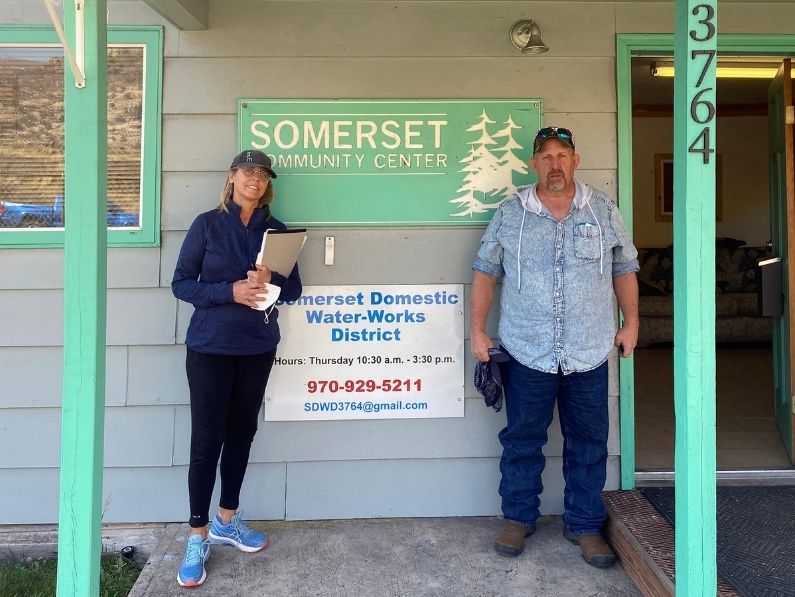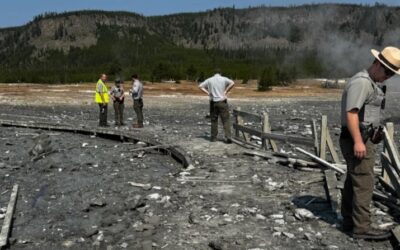The Colorado Department of Health and Environment notified residents of Somerset, a tiny unincorporated town in Gunnison County, that their water contained high levels of trihalomethanes last October. High concentrations can cause liver and kidney damage, as well as cancer. John Mlakar is 56 and has lived his whole life in Somerset.
“If that water’s no good; they’re hitting us for it,” he said. “There’s nothing we can do about it.”
Somerset is a community of about 100 mostly fixed-income residents. As the current president of the board for the Somerset Domestic Waterworks District, Mlakar has been tasked with fixing the town’s water problem — but he has a few objections.
“We don’t have our own system. We are buying water from the mine,” Mlakar said.
Enter Bill Koch, the somewhat less famous third brother of David and Charles Koch, who are known for their financial influence in right-wing politics. Bill Koch, a billionaire himself, owns the Oxbow Mine, where coal production began shortly before the turn of the century.
Somerset was born not long after. It was a classic company town, where workers were paid in scrip and the mine owned everything, including the water system.
The mine unionized in the early 60s, after which employees took ownership of the homes and the town. They established the water district, which, to this day, is the sole elected office in Somerset. The union signed a contract to buy water from the mine, and for decades the arrangement went smoothly.
“If he worked at the mine, they took the water bill out of your check,” Mlakar said. “It was like $6. I’m sure there were people that didn’t pay back then. But the mine didn’t care.”
Then, in the early 90s, as the system approached its centennial birthday, it became apparent that much-needed upgrades were necessary.
“People didn’t fix the plumbing or insulate it,” Mlakar said.
Marlene Crosby is Deputy County Manager for Gunnison County. Her first encounter with Somerset took place when she helped install a water metering system.
“They just ran water all night, all day and all night to keep their pipes from freezing,” she said.
Over the past 35 years, Crosby has witnessed disputes over not only water in Somerset, but also sewage, snow plowing, speed limits and more. She remembers a history of high emotions, stubbornness, distrust and dysfunction.
“I alternate from feeling sympathetic to feeling perturbed that they won’t do something to help themselves,” Crosby said.
The frustration runs both ways. While technically part of Gunnison County, Somerset is separated from the county seat by either a 35-mile dirt road over a high mountain pass or a trip through the famously treacherous Black Canyon. It’s—at a minimum—about a 140-mile round trip that can take up to eight hours. Somerset locals like to rib county politicians for showing up only in election years.
Mlakar, whose office itself is the result of recent political upheaval, will attest to a history of turnover on the board of the waterworks district. While he’s no fan of county government, he knows his real fight is with the mine. For now, Mlakar tells his constituents that their taxes will go up but that they’ll also eventually have clean water again.
But that’s today’s problem. What about tomorrow? The Oxbow Mine halted coal production in 2013 and once the mandated period of reclamation ends, the land will transfer to Gunnison Energy—another Koch-owned company—for natural gas development. Oxbow Mining will cease to exist, and with it, the mine says, also the contract to provide water to Somerset.
“The way I feel… they should be responsible for supplying us potable drinking water,” Mlakar said.
Still, history suggests that Mlakar and the Somerset Domestic Waterworks District will be tasked with solving the problem.
This story is part of a series with the Rocky Mountain Community Radio collaboration on how fossil fuels impact the West.





